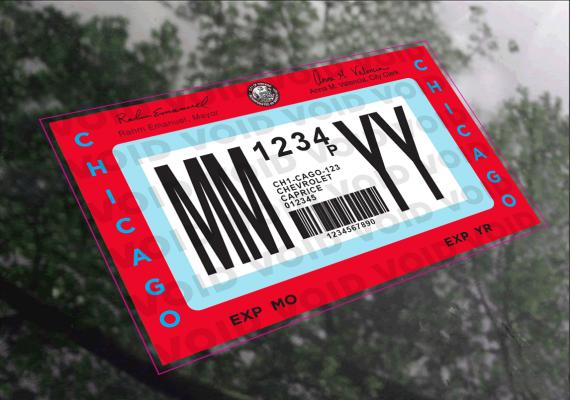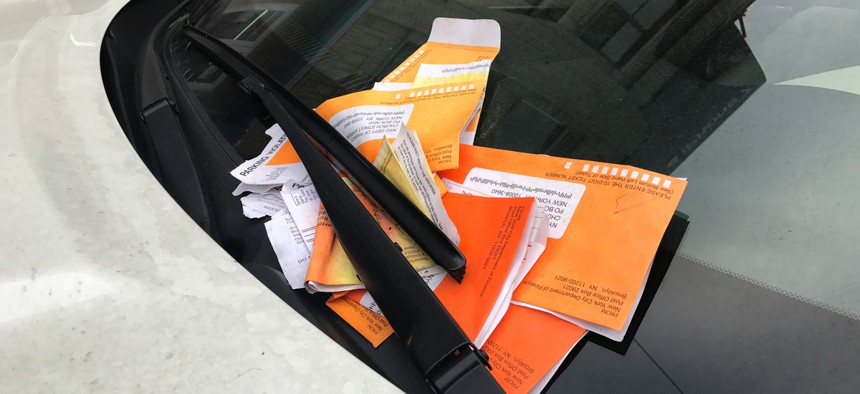Connecting state and local government leaders
Chicago has built a significant percentage of its city budget off of fines and fees. City leaders are now saying that isn’t fair.
There’s over $1.3 billion in ticket debt hanging over the residents of Chicago. That’s about $480 per resident—but the debt isn’t spread equally. Black and Hispanic residents of the city, who make up a significant percentage of the population on the city’s south and west sides, are disproportionately affected because ticketing practices targeted their neighborhoods.
That’s why City Clerk Anna Valencia sees the city’s new ticketing reform initiative as a form of racial justice. “Equity is important for any policy we make,” she said. “Policies put in place 20 or 30 years before our times have unintended consequences. When we have power, we have a responsibility to right the wrongs of the past.”
The city is piloting several reforms to wipe out resident debt, the largest of which focuses on city sticker debt. City stickers for vehicles are Chicago’s way of funding repairs for roads, and cost between $88 and $139 per year, depending on the vehicle’s weight. If a car lacks a sticker, or the sticker is expired, getting a ticket for that infraction costs $200, and with late fees can rise to $488. Drivers can’t purchase new stickers—renewed annually—until their debt is paid off, and can rack up multiple tickets for this failure while delinquent. Only one in three city sticker tickets are ever paid—and 40% of city sticker debt is held by people in black and Hispanic communities.
In July 2018, a ProPublica Illinois investigation revealed that the city has accrued over $500 million in unpaid city sticker tickets issued since 1990. The investigation exposed that the debt owed to city over stickers had led scores of people into bankruptcies, and caused tens of thousands of vehicle impoundments and driver’s license suspensions.
In December 2018, Valencia launched the Fines, Fees, and Access Collaborative to bring together city departments, community leaders, and researchers to figure out how Chicago could tackle issues like city sticker tickets and other fines that were dragging residents into debt. The Collaborative began its process of reform by seeking community input, hosting town halls to learn about which fines were most burdensome. Valencia said a particularly impactful story came from a city bus driver who was $5,000 in debt from city sticker tickets and who couldn’t enter into a payment plan because he would have had to put 50% down to start.
“People don’t want to break the law, they just can’t afford to pay a $200 ticket when they have groceries to buy,” said Valencia, who was first appointed to her office in 2017 and re-elected without opposition this year. “We realized we needed an affordable path to compliance. I’m grateful that community members trusted us to go on this journey.”
After several months, the group released a list of 14 recommendations, and the city council passed the first ordinance in July. The measure created an amnesty period during the month of October, where any resident could purchase a new city sticker without back charges or late fees. For anyone in compliance by October 31, the city is opening a forgiveness period in November and December. Anyone with a valid city sticker can apply to have up to three city sticker tickets forgiven. For those categorized as living with financial hardship, quantified as an income of 300% of the poverty level or less, can apply to have all of their city sticker ticket debt forgiven.
The city estimates that the debt forgiveness will reach around 500,000 drivers and eliminate hundreds of millions in debt. The final impact will depend on how many people partake in amnesty month. The city will release data on that figure in mid-November.

Valencia said it was important to give people relief before the city embarks on more long-term changes. “The community had to see action,” she said. “We showed them that we saw and heard them.” Mayor Lori Lightfoot, in a statement announcing the programs, said that they mark “a fresh start and a historic first step for Chicago residents who have struggled to get from underneath the grip of crushing ticket debt.”
In addition to the amnesty and forgiveness programs, the city council also voted to slash late penalties, ban consecutive and same-day ticketing for invalid city stickers, and reinstate a 15-day grace period for expired stickers.
Even though the reforms are expected to lead to massive debt reduction, Kim Drew, the legislative advocacy director of the Heartland Alliance, a member of the Collaborative, said that this was “very much an incremental step” and that the process of discovering burdensome fines was “a reality check” for the city. “It was hard work balancing competing interests,” she said. “The debate between incrementalism and broader reform was very real. Managing budget implications complicated that.”
Chicago gets about 7% of its operating budget from fines and fees, an outlier among large cities that usually only get around 1% of their budget from those sources, according to Lisa Foster of the Fines and Fees Justice Center, another member of the Collaborative. She said that there are “enormous consequences” to relying on fines and fees for such a large part of the budget. “People can literally be sucked into the criminal justice system via parking tickets,” she said. “This is such a low-hanging fruit for reform.”
Chicago isn’t the first place to consider fines and fees reform. San Francisco, Durham, New Orleans, and St. Paul are among some of the most prominent cities that have taken up the charge in the past year. Much of the movement for change is inspired by the fifth anniversary of the police shooting of Michael Brown, whose death revealed astonishing city ticketing practices in Ferguson, Missouri that were largely levied against black residents. The city of Ferguson funded 23% of its budget from fines and fees, and that was only changed through a federal consent decree.
Foster said city leaders that revamp their practices will often come to the realization that they can actually collect more money if they lower fines and fees to levels that residents can afford. Valencia agreed. “We have to change the way we’re doing business,” she said. Clearly the punitive hasn’t worked. We have millions of dollars in debt on the books that we’ll never collect on. So why not try something innovative?”
But Valencia said the issue can’t just be looking at the owed money as budget issue. “We have to look at the people behind the revenue,” she said. “The role of government is to remove barriers, not create them. It’s not right to raise revenue off the backs of the most vulnerable.”
City officials are now planning for more comprehensive changes, addressing booting for unpaid tickets, making payment plans more accessible (it’s now just $25 to enroll), changing ticketing policies, and showing support for broader state reform.
The Illinois legislature passed a bill on Tuesday that will end the practice of suspending licenses for non-driving related reasons. More than 50,000 licenses are suspended each year in the state for reasons that have nothing to do with driving, some as strange as truant minor charges, but the majority of which were unpaid parking tickets. Drew with the Heartland Alliance lobbied for that bill for three years, but said a big obstacle in the past was opposition from the city of Chicago that prevented many lawmakers from voting in support of the measure. The Collaborative’s findings and the policy changes in Chicago led to success at the state level, she said.
People from outside Illinois are also taking notice of the city’s work. Valencia said that several cities from across the country have reached out asking about how Chicago tackled fines and fees reform. “I tell them that there were a lot of times I didn’t think this was going to work,” she said. “But that isn’t an excuse.”
Drew said that she doesn’t think that Chicago should be looked at as a model for other cities—at least not yet. “In terms of how much work we have left to do, I’m not sure we’re the best example. We only skimmed the surface,” she said. “But we could be a process model, because we got all the right people to the table.”
Valencia agreed that the process was the most important part, saying meaningful reform requires cities to engage people like city department heads and mid-level management, community activists, nonprofit leaders, academics, parents, and clergy. “If you’re missing any perspective, it will fail,” she said. “And some people will say ‘why now?’ Why not now? Why should we let people go into bankruptcy? Why should people have to choose between rent and a ticket? Those shouldn’t be the options.”
Emma Coleman is the assistant editor for Route Fifty.

NEXT STORY: A Legislative Campaign to End Youth Tackle Football




